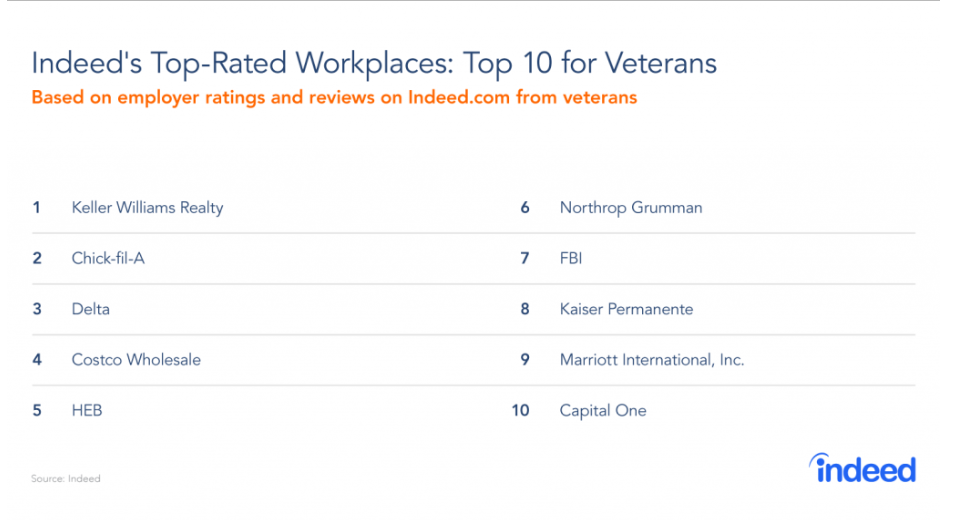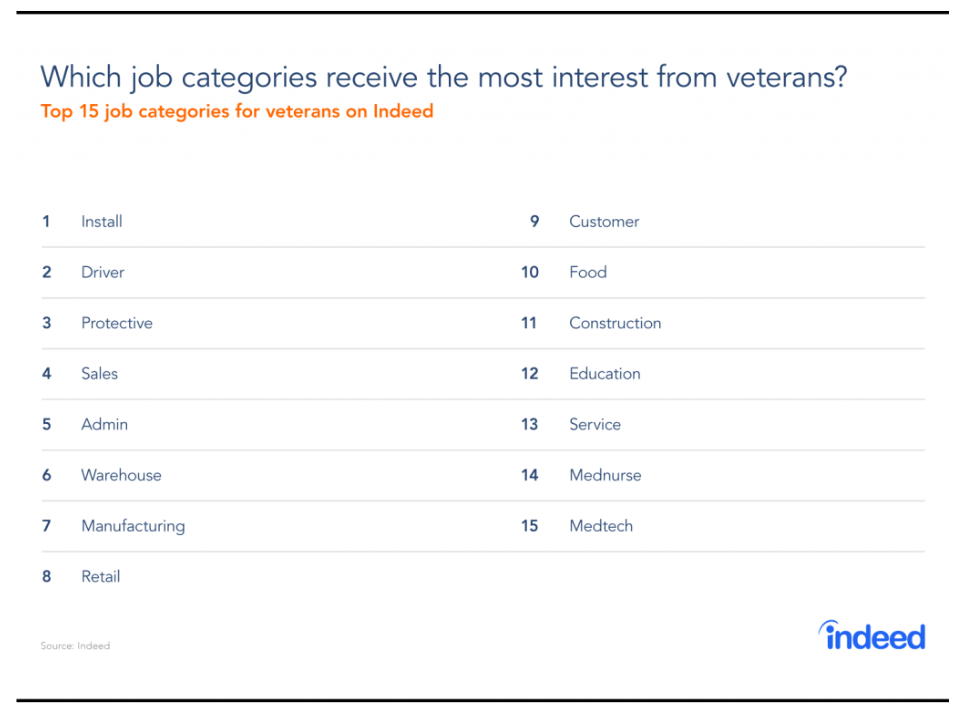When we hear “support the troops,” we often think about men and women deployed overseas. But those in military service face challenges not only in active duty — there are challenges for them at home as well, especially when they leave service.
In 2017, there were 20.4 million veterans in the US, of whom 4.1 million served at any point from 2001 forward. And up to 360,000 people leave military service each year. This large labor pool has valuable skills such as leadership, agile decision making and teamwork that can be an asset to many jobs. However, it can be difficult for veterans who are job seekers to see how their military skills are transferable, so veterans often pursue jobs without much previous experience required.
Problems exist beyond finding work. When veterans take corporate jobs, they often have trouble getting promoted and can feel underutilized and uninspired. In fact, between 60% and 80% of veterans leave their first civilian jobs before reaching two years there. But it is too important to let this talent go to waste. That’s why many corporate companies are investing heavily to recruit veterans in order to take advantage of their technical and leadership skills and are thinking strategically about how to retain them.
This Veterans Day, we wanted to celebrate the Top-Rated Workplaces by veterans. Indeed’s analytics team identified reviews from veterans in our 100-million-strong ratings and reviews database to come up with our rankings. Then we dug deeper to find out about specific initiatives supporting veterans in the top ten (scroll down to the bottom to see the top 50). Here’s what we found.
Top-Rated Workplaces by veterans
Our inaugural list of Top-Rated Workplaces by veterans includes a diverse mix of companies, from fast food to federal security. At the top of our rankings we see Texas-based international real estate franchise Keller Williams Realty.
Keller Williams boasts a family-like company culture and outlines the reasons they think veterans make great hires, such as their entrepreneurial nature, on a career page designed for veterans. Aside from flexible work schedules, some of the perks they offer employees include paid sabbaticals (the real estate giant also placed first on this year’s Top-Rated Workplaces for work-life balance) and discounts on fitness programs.
Fast-food restaurant Chick-fil-A came in as the number-two Top-Rated Workplace by veterans. The company has long been friendly to veterans, offering discounts and free meals on Veterans Day and other occasions. Chick-fil-A is also dedicated to hiring veterans and regularly features stories about veterans-turned-employees on their blog.
Airline giant Delta also receives strong reviews from veterans, coming in at number three. Delta employs over 10,000 veterans and is a participant in the 100,000 jobs mission, whose goal is to hire 100,000 transitioning service members and veterans by the year 2020. Delta also showcases stories of their employees with military backgrounds on a dedicated military hiring page, spotlighting skills like aviation mechanics and technical operations. According to Delta, “hiring transitioning service members and veterans isn’t just good for business. It’s the right thing to do.”
Wholesale retailer Costo comes in at number four this year. Not only does the company offer military discounts to customers, it also offers flexible hours for those attending school on the GI Bill, thus supporting education.
Rounding out the top five, meanwhile, we see H-E-B, a Texas-based grocery chain, who also topped our Top-Rated Workplaces in retail list this year. The company has highlighted the natural fit between veterans and H-E-B, citing their leadership experience and ability to work as a team.
Numbers six and seven seem like a direct fit for military skills. Northrop Grumman (#6) is an aerospace and defense technology company that was also rated number one among top-rated workplaces for millennials this year. In seventh place, the US Federal Bureau of Investigation (FBI) provides veterans with opportunities to extend their service to the country beyond the military context.
Finally, rounding out our top ten are number-eight Kaiser Permanente, the largest managed-care company in the US; number-nine Marriott International, Inc., a US-headquartered international hotel chain; and number-ten Capital One, a bank and lending corporation. The variety of companies included in the top ten list show that any firm has the potential to offer opportunities and great experiences to veterans if they dedicate some effort to it.
Skills and interests of veterans
We also wanted to know the types of jobs veterans are searching for. To do this, we analyzed the top job searches by veterans. The result is our top 15 list of job categories.
Similar to the range of companies included in those rated highly by veterans, the list of top job categories that they search for reveals a range of interests, from retail to food to health. However, over half of the top 15 job categories require relatively little prior experience to enter the field, perhaps indicating a job-search strategy of quickly getting a foot in the door, as opposed to capitalizing on specific transferable skills or interests.
Job searches by veterans that require minimal prior experience include installation (#1), driver (#2), protective (#3), admin (#5), warehousing (#6), manufacturing (#7), retail (#8), customer-facing work (#9), food (#10), construction (#11) and service work (#13). Some of these skills would be a fit for some of the top-rated companies by veterans: many of them require food and service work (Chick-fil-A, H-E-B, Marriott International), admin duties (all companies) or customer-facing skills (Keller Williams Realty, Delta, Costco and Capital One).
We also see jobs that potentially require more experience such as number 4 sales, number 12 education, number 14 mednurse and number 15 medtech. These fields often require at least a bachelor’s degree. These skills would match at top-rated Kaiser Permanente, for instance.
How to make veterans feel at home at your company
There are huge opportunities for companies to market their jobs to military job seekers, targeting the wealth of transferable skills they have and enabling them to realize their full potential in the workforce.
Based on a study by Innolect reported in the Harvard Business Review, the following are recommended practices to help veterans transition into your company.
- Making sure recruiters and staff understand military terms and culture will help those looking for talent be able to recognize it on a resume, even if it’s worded slightly differently.
- Along the same lines, an onboarding program that clearly teaches your company’s terminology and jargon will help veterans acclimatize more easily to how you talk about business.
- Because teamwork and camaraderie are such important parts of active duty service, resources like inclusion groups and mentorship programs can make veterans feel more connected to a company culture. Indeed is proud to have a 220-member veterans and allies resource group that identifies challenges and opportunities faced by veterans, provides support for ongoing career development and builds company-wide awareness of the value veterans bring to Indeed.
- And because it can be hard to compete with the mission of serving and protecting one’s country, be sure that job activities at your company are connected to a larger purpose when possible to inspire and motivate employees.
If military talent isn’t looking for you, it may be time to look for them. One way companies can tap into the veteran workforce is by using tools like Indeed Resume. A proud member of the Veteran Employment Advisory Council, Indeed has created a unique portal for veterans to post their resumes and access job search resources, resulting in a database of over 1.25 million qualified military candidates for employers to search through.
The easier we make it for veterans to enter the workforce and utilize their skills to the maximum, the more companies and vets themselves will benefit. It may take an effort on the part of employers, but it is worth it. Let’s all work together to find a way to attract and retain this unique talent in our workplaces.
For more information and solutions to guide your veteran hiring strategy, visit the Indeed for Veterans employer resource hub.
Authors
Ted Bauer
Originally from New York City, Ted Bauer currently lives in Fort Worth, Texas. He's a writer and editor for RecruitingDaily who focuses on leadership, management, HR, recruiting, marketing, and the future of work. His popular blog, The Context of Things, has a simple premise -- how to improve work. Ted has a Bachelors in Psychology from Georgetown and a Masters in Organizational Development from the University of Minnesota. In addition to various blogging and ghost-writing gigs, he's also worked for brands such as McKesson, PBS, ESPN, and more. You can follow Ted on Twitter @tedbauer2003, connect with him on LinkedIn, or reach him on email at [email protected]
Recruit Smarter
Weekly news and industry insights delivered straight to your inbox.






